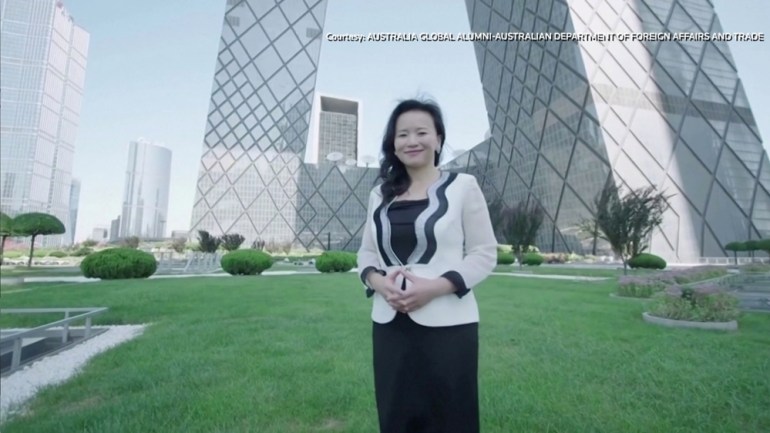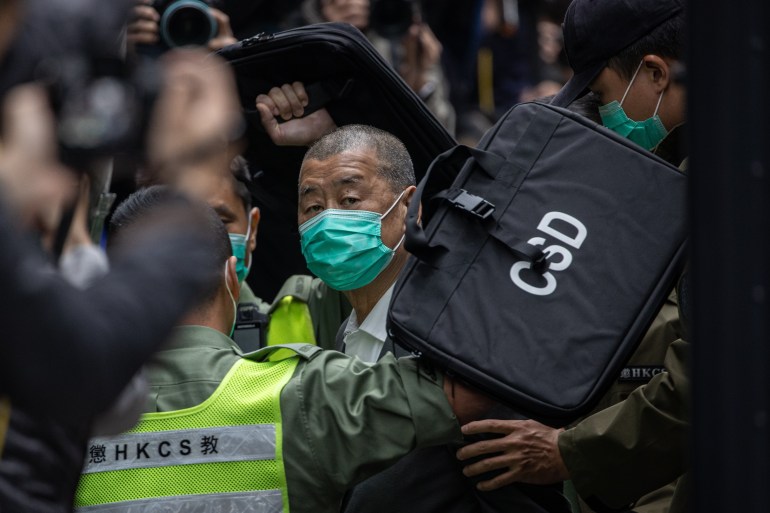‘Frantic race backwards’ for China media freedoms: Report
Reporters Without Borders says at least 127 journalists are detained in China, as Beijing takes ever harsher line on media freedoms.

At least 127 journalists – from major international news outlets to bloggers – are currently detained in China as the Chinese Communist Party continues a major crackdown on media initiated by President Xi Jinping, Reporters Without Borders (RSF) has said in a new report.
China now ranks 177 out of 180 in the media watchdog’s 2021 World Press Freedom Index, two slots above North Korea, thanks to a sweeping campaign to limit free expression across every sector of society.
Keep reading
list of 4 itemsChina bans BBC World News for content ‘violation’
China wants Jack Ma’s Alibaba to shed media assets: Report
Australia says China has formally arrested TV anchor for spying
In the report, published on Tuesday, Secretary General Christophe Deloire described China as a country in the midst of a “ frantic race backwards” as Chinese citizens continue to lose press freedom.
Chinese journalists and writers have become a target of the campaign and face charges such as espionage, subversion and “picking quarrels”. They include whistleblowers like Zhang Zhan, a Chinese lawyer who last year was sentenced to four years in prison for documenting the early days of the COVID-19 pandemic in Wuhan, and Cheng Lei, an Australian Chinese anchor at Chinese state media outlet CGTN who was formally arrested in February and accused of supplying state secrets overseas.
Prior to their formal arrest, many detained journalists may spend up to six months under “residential surveillance at a designated location (RSDL),” according to the media group. Institutionalised in China in 2012, the practice allows authorities to hold an individual in solitary confinement and constant supervision at a designated facility. The practice is frequently described as “torture” by those who have experienced it.
Cheng was detained in August 2020 and reportedly underwent RSDL before she was formally charged six months later. Her trial and sentencing have yet to be announced.
Nearly two-thirds of journalists detained in China are Uighurs, according to RSF, many of whom helped to raise the alarm about China’s campaign of repression against the Muslim ethnic minority and other groups in the far western region of Xinjiang. Uighur journalists and bloggers appear to face harsher sentences than their Han Chinese counterparts, like Ilham Tohti, an economist and founder of the website Uyghur Online who was sentenced to life in prison for “separatism” in 2014.

Affiliation with major news outlets or second citizenship in a Western country has also failed to protect Chinese journalists, who under Chinese law can only work as “news assistants” for foreign media.
The release of the report coincided with the first anniversary of the detention of Haze Fan, a news assistant for New York-based Bloomberg News, who was taken away by plain-clothes police officers in Beijing last year. On Tuesday, Bloomberg’s editor-in-chief John Micklethwait said the media group was “very worried about her well-being” after 12 months of detention.
In a bid to control Chinese journalists in the future, the report noted, Chinese journalists are required to download an app “Study Xi, Strengthen the Country,” which can download their personal data, while they will soon have to undergo 90 hours of ideological training each year to renew their press card.
While the country has never been known as an easy place to report from, foreign journalists say that conditions in China have become more challenging in recent years and even more so under COVID-19 regulations, according to surveys by the Foreign Correspondents’ Club of China. In 2020, 18 foreign journalists were forced to leave China due to deteriorating diplomatic relations between China, the United States and Australia.
China’s crackdown has also extended into Hong Kong, a former British colony once considered one of the most open places in Asia.
The territory is the regional headquarters of media organisations including CNN, AFP and Reuters due to its formerly high level of press freedom.

Following months of democracy protests in 2019 and the imposition of national security legislation, Hong Kong media has also found itself under attack, RSF said.
One of the highest profile cases was the closure of pro-democracy news outlet Apple Daily and the arrest of its founder Jimmy Lai, who is facing life imprisonment for “colluding with foreign forces” under the terms of the new legislation.
Six additional Apple Daily employees are also in detention, including the newspaper’s former chief editor and several writers.